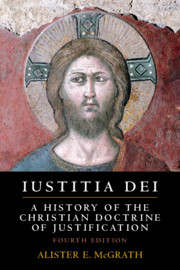Book contents
- Iustitia Dei
- Iustitia Dei
- Copyright page
- Contents
- Tables
- Preface to the Fourth Edition
- Abbreviations
- Introduction
- Part I Justification
- Part II The Middle Ages
- Part III Protestantism
- 11 Is There a ‘Reformation’ Doctrine of Justification?
- 12 Luther’s Early Approach to Justification
- 13 Justification in Lutheranism, 1516–1580
- 14 Reformed Theology, 1519–1560
- 15 The English Reformation
- 16 Protestant Orthodoxy
- 17 Anglicanism
- 18 Puritanism
- 19 Pietism
- Part IV Catholicism
- Part V The Modern Period
- Conclusion
- A Brief Glossary of Medieval Soteriological Terms
- Works Consulted
- Index
19 - Pietism
Justification and the ‘New Birth’
from Part III - Protestantism
Published online by Cambridge University Press: 27 January 2020
- Iustitia Dei
- Iustitia Dei
- Copyright page
- Contents
- Tables
- Preface to the Fourth Edition
- Abbreviations
- Introduction
- Part I Justification
- Part II The Middle Ages
- Part III Protestantism
- 11 Is There a ‘Reformation’ Doctrine of Justification?
- 12 Luther’s Early Approach to Justification
- 13 Justification in Lutheranism, 1516–1580
- 14 Reformed Theology, 1519–1560
- 15 The English Reformation
- 16 Protestant Orthodoxy
- 17 Anglicanism
- 18 Puritanism
- 19 Pietism
- Part IV Catholicism
- Part V The Modern Period
- Conclusion
- A Brief Glossary of Medieval Soteriological Terms
- Works Consulted
- Index
Summary
Chapter 19 analyses the approaches to justification found within the movement known as ‘Pietism’, which is generally regarded as a reaction against the excessive cerebralism of the theology of Lutheran Orthodoxy. Pietism developed a focus on a ‘living faith’ and the ‘new birth’, which countered a more intellectual and institutionalised account of the Christian faith dominant in German Lutheranism in the late seventeenth century. Pietist theologians and pastors – such as Philipp Jakob Spener – were suspicious of the Lutheran notion of ‘imputed righteousness’, which they considered as being destructive of piety. These concerns were developed in the writings of both John Wesley and Charles Wesley, who urged the importance of moving beyond purely forensic approaches to justification. John Wesley argued that the notion of ‘the imputed righteousness of Christ’ was neither Scriptural nor necessary, and was damaging to personal holiness. For Wesley, the ‘plain scriptural notion of justification’ is pardon or the forgiveness of sins.
Keywords
- Type
- Chapter
- Information
- Iustitia DeiA History of the Christian Doctrine of Justification, pp. 268 - 276Publisher: Cambridge University PressPrint publication year: 2020

